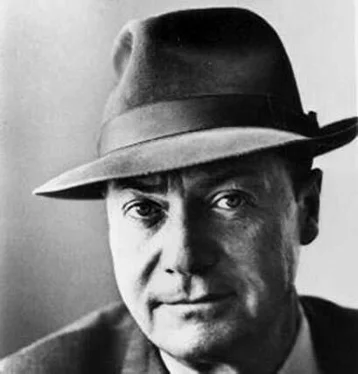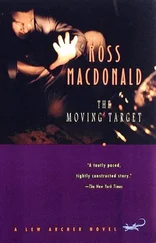Behind and below me, Benning was laboring up the stairs. I had pushed him pretty hard. His breathing was audible, to the woman as well as me.
“Sam?” she cried on a rising note, and whirled in a dancer’s movement.
I moved towards her. She reached backwards into the suitcase for something. I took her by the wrists. Her body was made of whalebone covered with plush. It was hard to subdue.
“Easy, Fern,” I said. “I wouldn’t hurt you.”
Downstairs, in the front of the house, the doorbell rang. The woman started. We stood together by the half-packed suitcase, the unmade bed, breathing hard into each other’s faces.
“If I turn you loose, will you promise not to shoot me?”
“I promise nothing.”
I lifted her from behind and carried her into the hallway. Below, the front door opened.
“Dr. Benning?” It was Gino’s voice.
“Don’t let him in,” I shouted.
Benning never heard me. A submachine gun pounded like an air-hammer at the shaky walls of his house.
The woman had ceased struggling in my arms. She was stiff with terror. I swung her behind me, took my revolver out, steadied my gun arm on the newel post. Gino came to the foot of the stairs with the Thompson in his hands. I shot him carefully through the face. Then I went to the telephone.
When I returned to the hallway, Benning was lying near the open door, his head in the woman’s lap. His hat was on its side beside him, in a growing pool of blood. When he spoke, the words made bubbling sounds in his throat:
“You won’t leave me, Fern? You promised you’d never leave me. I did it for you, everything for you.”
“I won’t leave you. Crazy fool. Crazy man.”
She cradled the naked, vulnerable head in her hands. He sighed, and his life came out bright-colored at the mouth. It was Dr. Benning who departed.
Sitting against the wall with the dead man in her arms, she talked to me, in the same cold heavy voice:
“I’m a swell picker, aren’t I? Durano, and now Sam Benning. I heard about Sam from a girl friend in the Springs, when I was two months gone. I could stand a trick baby, but not Durano’s. Did you ever see Durano?”
“I’ve seen him.” I sat on the bottom step and offered her a cigarette, which she refused.
“I stomached Angel for two years and a half. I owed him about that long. He took me out of a strip joint in Gary and gave me everything. Everything I wanted. But a baby was too much. I took a runout powder, and came up here to Sam. He didn’t know me from Eve, but he took care of me. Even when he found out who I was, and who Durano was, he let me stay. He wanted me to stay. He was crazy about me, crazy in more ways than one. But he had guts.” She looked down at the blind face clasped to her breast: “You weren’t afraid, were you, Sammy? Not for a while, anyway.”
Her gaze, blue and remote, swung back to me: “He started to lose his grip when Lucy came. She was my maid, sort of, I brought her out of Gary along with me. Hell, she was my best friend. Too bad Sammy never got that straight. Lucy came up last month and brought my things, all she could get away with. Then she was afraid to go back. I didn’t want her to, either. Durano would squeeze it out of her where I was. So Sam found her a place to stay up here. I knew it couldn’t last after Lucy came. A month was the best we could hope for. Durano’s men found Lucy then. She didn’t cover her traces the way I did. Gino went to see her Tuesday night. She had to play along. What could she do? She said she needed forty-eight hours to finger me, that I was hiding out in the mountains and only came to town once a week for groceries.
“They left a watch on her. It took her most of yesterday to throw them off and get over here without giving me away. I wasn’t even here when she arrived. But Sam was. She spilled the thing to him, and he got the fantods and decided that Lucy had to be silenced. He knew that if she talked to Gino, that was the end of us. Sam was afraid for his life, but mostly I guess he didn’t want to lose me. So he sneaked over there in the middle of the night and cut her throat for her. Today after you came I asked him if he did it and he admitted it. You had good reason to be afraid, didn’t you, Sammy?” A dark and cynical tenderness growled in her voice. “Stop me if I’m breaking your heart, Archer or whatever your name is.”
Somewhere outside in the night a siren screamed, very loud, as if the noise could make up for its tardiness.
“They’ll be holding you for material witness,” I said. “At least.”
She shrugged, and the dead face moved against her. “I couldn’t care less. Where would I want to go that I haven’t been? Anyway, Angel can’t get at me in the clink.”
She was still in the same position when the city police walked in. She looked up at them coldly.
They held me, too, until Santana established that I had shot Gino in self-defense. I was in the Sheriff’s office when Alex Norris was released. His mother was there with Santana, waiting to greet him. It was bright morning by then.
Alex had very little to say to his mother. He wanted to know where Lucy’s body was. When Santana told him, he set out for the morgue by himself. I felt sorry for Mrs. Norris, but there was nothing I could do for her. Her son had stood too close to the fire and been burned. Chicago, the northern cities, had caught up with both of them.
Gino died in the County Hospital two days later, without having had a visitor. His automobile was charged with concealment of weapons, found guilty, and impounded for official use by the Sheriff’s staff. Fern Dee, or whatever her name was, was released the following Monday. She disappeared. At the end of the month, Santana sent me a check for eighty dollars. One day’s pay and expenses.
Published as “The Imaginary Blonde,” in Manhunt , February 1953.
A Note to the Reader
Sequential presentation for the first time of “Strangers in Town” and “Gone Girl” underscores certain similarities between these stories.
“Strangers in Town” was written in 1950 for submission in that year’s Ellery Queen’s Mystery Magazine contest, then withdrawn by Ross Macdonald to be used as a framework for a novel : The Ivory Grin ( published in 1952). The author later incorporated other elements of the unpublished “Strangers in Town,” including some verbatim sentences, into the short story “Gone Girl” (printed in 1953 ).
Comparison of the stories shows the different uses to which Macdonald might put similar material – the inventive variations he was able to play on a given theme: one of the hallmarks of his fiction .
– Tom Nolan
It was a Friday night. I was tooling home from the Mexican border in a light blue convertible and a dark blue mood. I had followed a man from Fresno to San Diego and lost him in the maze of streets in Old Town. When I picked up his trail again, it was cold. He had crossed the border, and my instructions went no further than the United States.
Halfway home, just above Emerald Bay, I overtook the worst driver in the world. He was driving a black fishtail Cadillac as if he were tacking a sailboat. The heavy car wove back and forth across the freeway, using two of its four lanes, and sometimes three. It was late, and I was in a hurry to get some sleep. I started to pass it on the right, at a time when it was riding the double line. The Cadillac drifted towards me like an unguided missile, and forced me off the road in a screeching skid.
I speeded up to pass on the left. Simultaneously, the driver of the Cadillac accelerated. My acceleration couldn’t match his. We raced neck and neck down the middle of the road. I wondered if he was drunk or crazy or afraid of me. Then the freeway ended. I was doing eighty on the wrong side of a two-lane highway, and a truck came over a rise ahead like a blazing double comet. I floorboarded the gas pedal and cut over sharply to the right, threatening the Cadillac’s fenders and its driver’s life. In the approaching headlights, his face was as blank and white as a piece of paper, with charred black holes for eyes. His shoulders were naked.
Читать дальше












